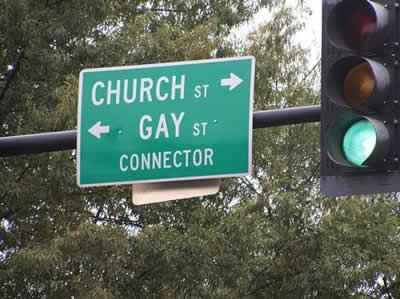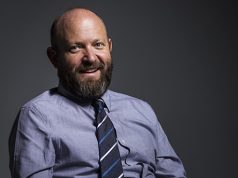
TLC recently aired a reality program called “My Husband’s Not Gay,” about Mormon women whose husbands are gay (sorry, ladies!). The title was presumably meant to be sarcastic, like when New Jersey is called “the Garden State,” or when TLC was called “The Learning Channel.”
I didn’t see the show. I don’t even have cable, let alone one of those “Clockwork Orange” devices that pries your eyes open to make you watch something. But from what I understand, it spotlighted three Salt Lake City couples where the husbands are attracted to men but are married to non-men. Contrary to what you’d expect, these marriages were not the result of an escalating series of hilarious misunderstandings, but were done on purpose, because the men, while acknowledging their homosexuality, don’t want to act on it or call it that. They call it “same-sex attraction,” and they believe acting on it would be sinful. The wives know about their husbands’ predilections and are OK with it, though they’re also a little defensive about it, which you can understand, what with their husbands being gay and all.
As a gay Mormon, just reading about the program made me very, very sad. I can’t imagine living a life of such repression and despair that I would willingly appear on a reality show.
Also, maybe some of these marriages are not 100 percent satisfying, sexwise? But that’s actually none of my business (and, if sitcoms have taught me anything about marriage, not uncommon). If two people I’ve never met say they’re in love and have a great marriage, I’ll take their word for it. What do I care? What am I, the love police? Lots of unorthodox arrangements work just fine for lots of people. Some couples have what is called an “open marriage,” which is just like a regular marriage except you don’t have to take it seriously. Some people have spouses who are many decades older, or hundreds of pounds fatter, or multiple degrees dumber, than themselves. Why, I’ve even heard tell of people being married to Newt Gingrich.
Any of these situations might strike the average person as unnatural or indecent, an affront to all that is good and holy. And sure, I might be skeptical about the strength of the relationship. I might have no interest in following that same path myself. I might even throw up in my mouth a little bit. But if all the involved parties are informed and consenting, and nobody’s breaking the law, and they’re not trying to say that their way is the only right way, and I don’t have to watch, then my views on their marriage are irrelevant.
Anyway, reading about the show reminded me of two things. One, that the people on reality TV are pathetic attention whores who should be ignored, for their own good and the good of society. And two, that I don’t like the term “same-sex attraction.”
It’s unnecessary. We already have a perfectly good word for being attracted to the same sex, and the word is “gay.” Yes, “gay” used to mean something else, and it still does mean that when you sing Christmas carols, but it doesn’t mean that anymore. (And, side note: if you’re one of those people who still express bitterness over the gays stealing your word and turning it icky, bear in mind that “homosexual” has been the primary definition of “gay” since the 1960s, so you’ve had 50 years to get over it, so get over it.)
“Same-sex attraction” — or “SSA” as the kids call it in the chatrooms — came to be used by religious folks because they felt “gay” had too much baggage. (I know I do!) The way the word was commonly used, it often implied that people who identified as gay also lived “the gay lifestyle” (i.e., had gay sex, and apparently so much of it that it constituted a lifestyle). People to whom such distinctions mattered needed a way to differentiate between “practicing” homosexuals and people who have homosexual feelings but don’t act on them. “College a cappella club” was already taken, so they settled on “same-sex attraction.”
The unwieldy phrase was also useful because of the prevailing belief among religious leaders that homosexuality could be cured. So a Mormon man, for example, who was attracted to other men but wanted to live the gospel by not acting on those urges might be reluctant to label himself “gay” if he believed the condition was merely temporary. Better to say he’s “same-sex attracted.” As in: “I used to be same-sex attracted, but then I married LurLeen, and that cleared it right up!”
Things have changed, though. The prevailing sentiment in the LDS Church now is that most “same-sex attracted” people are going to stay that way throughout their mortal lives. Never rule out the possibility of a miracle, but, uh, don’t hold your breath, either, y’know? Church leaders don’t say, like some of them used to, that homosexuality is definitely reversible (or preventable), or that marrying a woman is a good way to go about it. Now they say to live a good life, keep the commandments, and trust God to sort everything out. The idea of “changing” a gay person into a straight one, when it does arise, is now generally met with the dismissive eye-rolling it deserves.
Furthermore, as these issues have come to be discussed more openly, society has discovered new types of gays. People who identify as “gay” might be sexually active pride-parade organizers, or they might be closeted virgins. They might be as monogamous as a Puritan, or as slutty as a Unitarian. They might be only mostly gay, with some attraction to the opposite sex, but not enough to qualify as a registered bisexual. They might be faithfully and happily married to a woman despite being mostly gay. (They might also be unfaithfully and unhappily married to a woman.) They might be flamboyant, masculine, effeminate, macho, or none of the above. There are gays who, like me, are active, faithful religious adherents, gays who are atheists (gaytheists, they’re called), and gays everywhere in between.
There aren’t any gays who play sports, though. That’s just science.
When I say that I’m gay, all I mean, and all that should be inferred, is that I’m primarily attracted to men (specifically, Jake Gyllenhaal). When I say I’m a gay Mormon, all that should be understood is that I’m primarily attracted to men, and I also like Jell-O. “Gay Mormon” doesn’t, by itself, indicate how devout a person is toward either of those things. To insist “I’m not ‘gay,’ I’m ‘same-sex attracted'” is to worry that “gay” says more about you than it actually does, today, in whatever year this is.
“Gay” is fine. We’re taking it back. It doesn’t only mean wanton, depraved sex addicts who spend their evenings and weekends dressing in leather and destroying traditional marriage (although it does include them). It applies to many types of people in many types of situations. You ladies who are married to men who are attracted to other men, your husbands are indeed gay: “attracted to other men” is what gay means! And that’s OK! Your situation may be unusual, and you may have a hard time explaining it to people — but if you’re both happy, so what? Do your thing. Just don’t do it on TV, because that’s sad.




